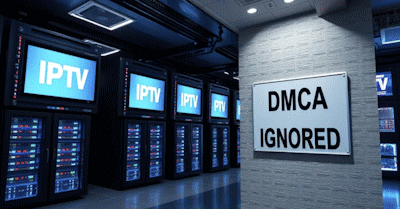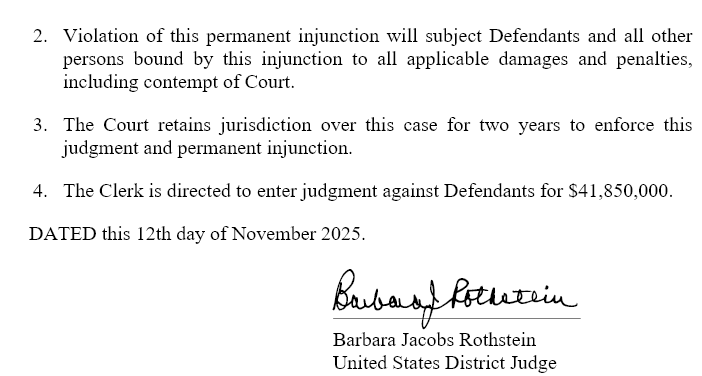 When a US-based web host receives a credible DMCA takedown notice, it’s often a sign that action is required to resolve the complaint. That usually means taking down allegedly infringing content uploaded by a third party.
When a US-based web host receives a credible DMCA takedown notice, it’s often a sign that action is required to resolve the complaint. That usually means taking down allegedly infringing content uploaded by a third party.
Having met its obligations under the DMCA, compliance typically means that the host avoids liability for third-party infringement. Some overseas hosts operate somewhat differently, however, embracing non-compliance as a beneficial service feature.
DISH Network vs. Virtual Systems, LLC
In the world of ‘offshore’ and ‘bulletproof’ hosting, DMCA non-compliance typically comes as standard. Ukraine-based Virtual Systems, LLC (also known as VSYS Host) advertises itself as a ‘DMCA-ignored’ host, meaning that when DMCA notices instruct the company to take content down, no action is taken.
In October 2024, a lawsuit filed at a Seattle district court accused Virtual Systems, LLC, and its alleged owner and CEO, Vyacheslav Smyrnov, of doing just that.
Filed by broadcaster DISH Network and supported by the International Broadcaster Coalition Against Piracy (IBCAP), the complaint alleged that pirate IPTV services used Virtual Systems’ servers to illegally ‘transmit’ linear streams and VOD content, to which DISH owns the rights.
“Users accessed the Works through a set-top box (STB) or a website that links to the Works or provides a playlist used to access the Works. Users often had to purchase a subscription to view the Pirate Services’ content, in addition to purchasing any required STB. DISH did not authorize the Pirate Services to distribute or publicly perform the Works and received no compensation from them,” the complaint alleged.
DMCA Takedown Notices Universally Ignored
At least in part, the lawsuit targeted unfinished business. Three of the IPTV providers hosted by Virtual Systems were on the losing end of previous legal action in the United States. They were restrained from further infringement under a permanent injunction with the same applying to Virtual Systems. DMCA non-compliance was an additional aggravating factor.
“Virtual Systems and Smyrnov, collectively, were the recipients of at least 512 Infringement Notices. Virtual Systems did not respond to the Infringement Notices and did not take any measures to stop the Pirate Services’ infringement occurring on its servers and network. The Pirate Services kept infringing DISH’s copyrights in Works aired on the Channels, even using the same IP addresses and URLs previously reported to Virtual Systems,” the complaint continued.
In May 2025, a DISH status report[1] running to 370-pages described work to comply with the requirements of Ukraine, with Smyrnov reportedly served under the Hague Convention. Local issues included what appeared to be an attempt by Smyrnov to file a pro se answer to the DISH complaint. But with no signature and other critical shortcomings, the complaint officially went unanswered.
$41.8m Judgment in Favor of the Plaintiff
A default judgment was perhaps the most likely outcome from the beginning and with no direct contact and no answer on file, a win by default seemed all but inevitable.
An order issued this week dated November 12 notes Virtual Systems’ policy on DMCA compliance, which seems to strongly favor the customer, including those with “occasional” copyright issues.

The court also restated the three willful secondary copyright infringement claims in the original DISH complaint, the company’s request for damages, plus a permanent injunction.
Count I – Materially Contributing to Copyright Infringement;
Count II – Inducing Copyright Infringement; and
Count III – Vicarious Copyright Infringement.Damages up to $150,000 for each registered work infringed.
Finding no obstacle to granting a default judgment, the court considered DISH’s request for maximum damages of $150,000 for willful infringement of each of the 279 copyrighted works listed in the complaint.
A Reasonable Request for a Significant Sum of Money
Noting that a judgment of $41,850,000 is expressly authorized by the Copyright Act, the court nevertheless described the eight-figure claim as “a significant sum of money.”
After weighing various factors, including DISH’s withdrawal of claims for profits attributable to the infringement, plus attorneys’ fees and costs, overall DISH claimed for less than it was entitled. As a result, a judgment of $41,850,000 was viewed as reasonable.
DISH was also granted a permanent injunction, which includes “a prohibition on providing any servers or network used in streaming or transmitting the material and requires termination of any current or future accounts of customers that stream or transmit the material.”

Chris Kuelling, executive director of IBCAP, welcomes the judgment and notes that failing to comply with takedown notices can prove expensive, including on a personal level.
“This ruling against Virtual Systems and its owner is another example of the consequences for hosting providers that choose to ignore takedown notices from IBCAP,” Kuelling says.
“IBCAP does not tolerate hosting providers and content delivery networks that disregard the law and fail to comply with our takedown notices. The result of such noncompliance is not only a permanent injunction, but also significant monetary damages, in this case more than $41 million, personally owed by the owner, Mr. Smyrnov.”
In comments to TorrentFreak, Kuelling says that the Ukrainian courts “seem to be in session and working despite the war” so IBCAP are ready for the next stage.
“With this order now in hand the attorneys will turn their efforts to collection and enforcement of the injunction,” he concludes.
The order granting default judgment is available here (pdf)
From: TF, for the latest news on copyright battles, piracy and more.
Powered by WPeMatico
